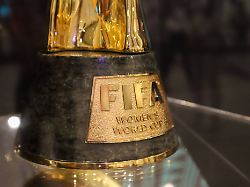FIFA and EBU agree
TV blackout averted for women’s soccer World Cup
06/14/2023, 5:25 p.m
The worst-case scenario does not occur, the women’s soccer World Cup is broadcast on free-to-air television in Germany. Five weeks before the start of the tournament in Australia and New Zealand, an agreement is reached between the European Broadcasting Union and FIFA. ARD and ZDF broadcast.
Apparently a late solution has been found in the dispute over the television rights for the Women’s World Cup. A contract that allows ARD and ZDF to broadcast the games in Australia and New Zealand has been signed, as ARD announced. The contractual partners of the world football association FIFA are not the broadcasters themselves, but the European Broadcasting Union (EBU).
“I am very pleased that we can offer women’s football the stage that the players and the audience deserve this year,” said ARD sports rights director Tom Buhrow on the agreement.
After months of disputes with public accusations, a contract is now about to be concluded that will allow both sides to save face. ARD and ZDF had previously negotiated directly through their sports rights agency SportA. Now the two broadcasters are to receive their rights from FIFA via the EBU, just like public broadcasters in other European countries.
A FIFA spokesman had previously said: “We are still in talks.” At the same time, he emphasized that there would be “no blackout” – a tournament without moving pictures in Germany. The federation spokesman continued: “We prefer coverage on public television, but we can also show the matches on FIFA+.” This alternative plan should have been done with it.
So far, the big tournaments in Germany have been broadcast on ARD and ZDF, which also submitted the best offer for the German TV market in the tender for the 2022 World Cup. However, the offer was too small for FIFA. President Gianni Infantino publicly called for more money without giving specific figures. The only thing that is certain is that the amount involved was in the mid-single-digit millions.
Almost five weeks before the start of the tournament in Australia and New Zealand on July 20, the fronts between the association and ARD and ZDF seemed to have hardened. ARD sports coordinator Axel Balkausky recently said at the SpoBis congress: “In the normal world you would sit down and come to a solution. But both sides have to be ready for that.” Persons entrusted with the negotiations had recently stated several times that there was no progress and no real negotiations. Thanks to the trick with the EBU, there is now a solution.
